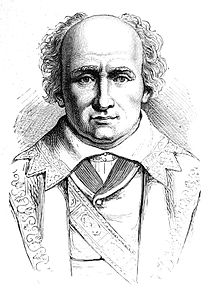Louis Gohier
| Louis-Jérôme Gohier | |
|---|---|

Louis Gohier (Album du Centenaire)
|
|
| Born |
27 February 1746 Semblançay, Indre-et-Loire, France |
| Died | 29 May 1830 (aged 84) Eaubonne, Val d'Oise, France |
Louis-Jérôme Gohier (27 February 1746 – 29 May 1830) was a French politician of the Revolutionary period.
Louis-Jérôme Gohier was born in Semblançay, in the Indre-et-Loire department of France. The son of a notary, he practiced law in Rennes. In 1789, he was one of the deputies of the tiers état (Third Estate, representing the "Commoners") elected to represent the town in the Estates-general. In the Legislative Assembly, he represented Ille-et-Vilaine, taking a prominent part in the deliberations. He protested against the exaction of a new oath from priests (22 November 1791), and demanded the sequestration of the émigrés' property (7 February 1792).
Gohier was Minister of Justice from March 1793 to April 1794, overseeing the arrest of Girondists, and a member of the Council of Five Hundred. He succeeded Jean Baptiste Treilhard in the French Directory (June 1799), where he represented the republican view in front of growing royalist opposition.
When Bonaparte suddenly returned from the Egyptian campaign in October 1799, he repeatedly tried to win Gohier, who was then president of the Directory, to his political projects. After Bonaparte's 18 Brumaire (9 November 1799) coup d'état, Gohier refused to resign his office, and sought an audience with Bonaparte at the Tuileries Palace, in an attempt to save the Republic. He was put under arrest and escorted to the Luxembourg Palace. On his release, two days later, he retired to his estate at Eaubonne.
...
Wikipedia
